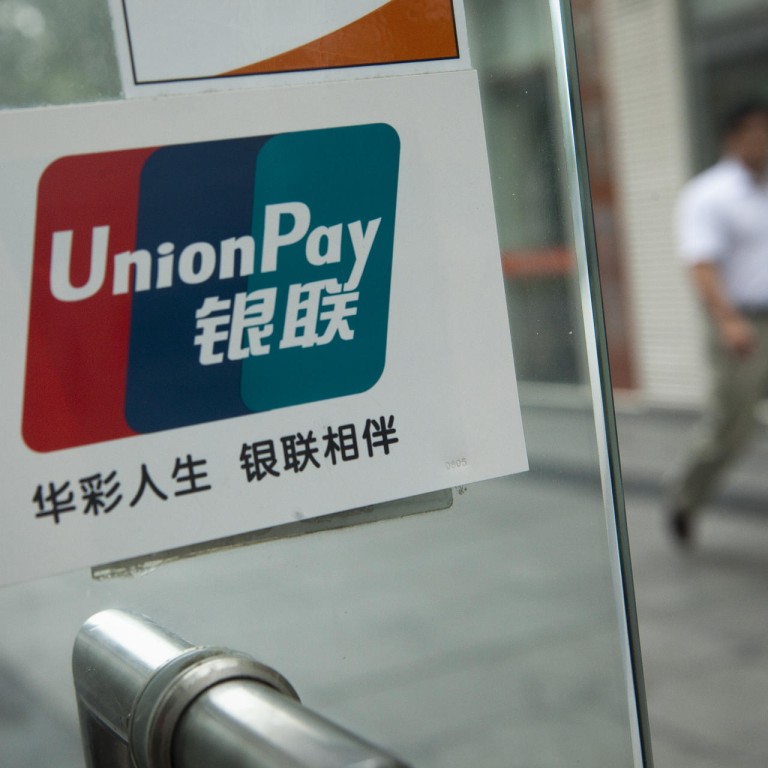
Chinese regulators keep foreign credit card issuers on tight leash
International credit card companies face obstacles on the mainland as regulators uphold restrictions on overseas firms
Creative branding will only take foreign credit card issuers on the mainland so far, experts said, so long as Beijing upholds strict controls on outside players in the domestic card market.
Card issuer American Express recently made what sounds like an industry breakthrough, given the tough regulations that say foreign companies cannot go it alone when issuing cards that deal in both yuan and US dollars.
The company said it had teamed up with China Minsheng Bank to issue a "single network, multi-currency" credit card. That means the card operates exclusively on the US company's network and is not routed via mainland card monopoly China UnionPay. The card sports only an American Express logo and is not co-branded with a UnionPay mark like most foreign credit cards on the mainland.
But issuing a multi-currency card on the mainland is not that simple. Customers at Minsheng Bank will receive two separate cards at the same time - one for yuan-denominated transactions at home, the other for payments made in US dollars abroad. The domestic card bundled with the international one is branded with a UnionPay logo, the Minsheng Bank website shows, keeping the cards well within regulations that say credit cards issued for yuandenominated spending must be processed by UnionPay.
"Sounds like a very creative strategy. But it's not that surprising in this environment," said Li Wei, a finance professor at Cheung Kong Graduate School of Business in Beijing.
Regulators still keep foreign companies on a tight leash when it comes to cross-border transactions. That has given rise to a series of unique products in the card market, many of which rely on customer spending abroad.
"We work with our issuing partners in China to design products that meet the needs of the Chinese consumers, especially the premium segment which is an important aspect of American Express's China business strategy," said Dave Keung, vice-president and general manager for partner card services at American Express in China. The company declined to comment on regulatory issues.
Minsheng Bank said the card targeted "elite customers that make overseas transactions".
Critics say regulators did not make good on promises to open the card business to foreign companies by 2006, one of several commitments the mainland made in order to enter the World Trade Organisation.
In late June, Britain's Standard Chartered became the second Western bank on the mainland to issue its own credit cards, after the United States' Citibank launched a card in 2012. However the British bank issued two different cards, keeping domestic accounts separate from those for spending abroad.
One card recently issued by Standard Chartered, known as the "zhitong" card, was branded as a debit card but functions like a credit card - an attempt to partially skirt regulations, an industry insider pointed out. Cardholders can apply for small, unsecured loans via an overdraft service, making the debit card "almost the same as an ordinary credit card".
Card issuers learned last year that pushing too hard against the rules can lead to a clampdown. In June last year, the People's Bank of China ordered an immediate halt to payments processed by MasterCard through a Shenzhen-based company, demonstrating little tolerance for yuan transactions outside the UnionPay network.
The continued enforcement comes amid growing international pressure on Beijing to live up to its WTO commitments. In July 2012, the WTO ruled the mainland was still discriminating against foreign card issuers.
The tight restrictions are starting to hurt as the market for credit cards on the mainland surpasses 400 million active cards. Banks and card issuers have little choice but to carve out a niche dependent on high-end customers that travel abroad, experts said.
"It is obvious foreign banks do not intend to compete with local banks in issuing a large number of cards," said Neil Wang, managing director at consultancy Frost & Sullivan in China.
Standard Chartered was focusing on people working or studying abroad who had assets worth more than 1 million yuan (HK$1.26 million), Wang said. The bank would have to rely on its reputation among employees of multinational firms as awareness of the bank on the mainland was limited, he added.
In recent years, foreign credit card issuers on the mainland have ramped up premium services on their cards, Li said.
Many cards offer free airport pickup in large cities, access to airport lounges, international travel insurance deals, among other perks directed at international travellers.
Minsheng Bank's latest card offers a package for international students ranging from free language training on the mainland to assistance finding a house abroad, according to its website.
The credit limit on foreign-issued cards was also a selling point, Li said. Cards offered in developed markets often provided a line of credit much higher than cards issued by mainland banks.
"They have to go for the top of the market," Li said, noting that there were already 13 mainland banks that had more than 10 million active cards in issuance. "China is now a very competitive market … foreign banks have a very limited reach."
